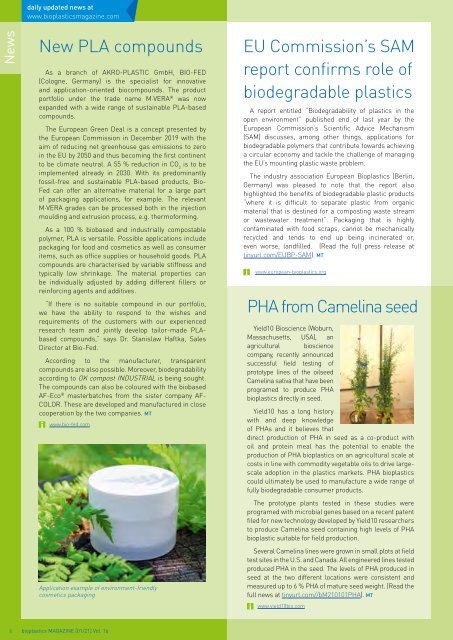Issue 01/2021
Highlights: Automotive Foam Basics: Enzymes
Highlights:
Automotive
Foam
Basics: Enzymes
You also want an ePaper? Increase the reach of your titles
YUMPU automatically turns print PDFs into web optimized ePapers that Google loves.
daily updated news at<br />
www.bioplasticsmagazine.com<br />
News<br />
New PLA compounds<br />
As a branch of AKRO-PLASTIC GmbH, BIO-FED<br />
(Cologne, Germany) is the specialist for innovative<br />
and application-oriented biocompounds. The product<br />
portfolio under the trade name M·VERA ® was now<br />
expanded with a wide range of sustainable PLA-based<br />
compounds.<br />
The European Green Deal is a concept presented by<br />
the European Commission in December 2<strong>01</strong>9 with the<br />
aim of reducing net greenhouse gas emissions to zero<br />
in the EU by 2050 and thus becoming the first continent<br />
to be climate neutral. A 55 % reduction in CO 2<br />
is to be<br />
implemented already in 2030. With its predominantly<br />
fossil-free and sustainable PLA-based products, Bio-<br />
Fed can offer an alternative material for a large part<br />
of packaging applications, for example. The relevant<br />
M·VERA grades can be processed both in the injection<br />
moulding and extrusion process, e.g. thermoforming.<br />
As a 100 % biobased and industrially compostable<br />
polymer, PLA is versatile. Possible applications include<br />
packaging for food and cosmetics as well as consumer<br />
items, such as office supplies or household goods. PLA<br />
compounds are characterised by variable stiffness and<br />
typically low shrinkage. The material properties can<br />
be individually adjusted by adding different fillers or<br />
reinforcing agents and additives.<br />
“If there is no suitable compound in our portfolio,<br />
we have the ability to respond to the wishes and<br />
requirements of the customers with our experienced<br />
research team and jointly develop tailor-made PLAbased<br />
compounds,” says Dr. Stanislaw Haftka, Sales<br />
Director at Bio-Fed.<br />
According to the manufacturer, transparent<br />
compounds are also possible. Moreover, biodegradability<br />
according to OK compost INDUSTRIAL is being sought.<br />
The compounds can also be coloured with the biobased<br />
AF-Eco ® masterbatches from the sister company AF-<br />
COLOR. These are developed and manufactured in close<br />
cooperation by the two companies. MT<br />
www.bio-fed.com<br />
Application example of environment-friendly<br />
cosmetics packaging<br />
EU Commission’s SAM<br />
report confirms role of<br />
biodegradable plastics<br />
A report entitled “Biodegradability of plastics in the<br />
open environment” published end of last year by the<br />
European Commission’s Scientific Advice Mechanism<br />
(SAM) discusses, among other things, applications for<br />
biodegradable polymers that contribute towards achieving<br />
a circular economy and tackle the challenge of managing<br />
the EU’s mounting plastic waste problem.<br />
The industry association European Bioplastics (Berlin,<br />
Germany) was pleased to note that the report also<br />
highlighted the benefits of biodegradable plastic products<br />
“where it is difficult to separate plastic from organic<br />
material that is destined for a composting waste stream<br />
or wastewater treatment”. Packaging that is highly<br />
contaminated with food scraps, cannot be mechanically<br />
recycled and tends to end up being incinerated or,<br />
even worse, landfilled. (Read the full press release at<br />
tinyurl.com/EUBP-SAM). MT<br />
www.european-bioplastics.org<br />
PHA from Camelina seed<br />
Yield10 Bioscience (Woburn,<br />
Massachusetts, USA), an<br />
agricultural bioscience<br />
company, recently announced<br />
successful field testing of<br />
prototype lines of the oilseed<br />
Camelina sativa that have been<br />
programed to produce PHA<br />
bioplastics directly in seed.<br />
Yield10 has a long history<br />
with and deep knowledge<br />
of PHAs and it believes that<br />
direct production of PHA in seed as a co-product with<br />
oil and protein meal has the potential to enable the<br />
production of PHA bioplastics on an agricultural scale at<br />
costs in line with commodity vegetable oils to drive largescale<br />
adoption in the plastics markets. PHA bioplastics<br />
could ultimately be used to manufacture a wide range of<br />
fully biodegradable consumer products.<br />
The prototype plants tested in these studies were<br />
programed with microbial genes based on a recent patent<br />
filed for new technology developed by Yield10 researchers<br />
to produce Camelina seed containing high levels of PHA<br />
bioplastic suitable for field production.<br />
Several Camelina lines were grown in small plots at field<br />
test sites in the U.S. and Canada. All engineered lines tested<br />
produced PHA in the seed. The levels of PHA produced in<br />
seed at the two different locations were consistent and<br />
measured up to 6 % PHA of mature seed weight. (Read the<br />
full news at tinyurl.com//bM21<strong>01</strong><strong>01</strong>PHA). MT<br />
www.yield10bio.com<br />
6 bioplastics MAGAZINE [<strong>01</strong>/21] Vol. 16


















